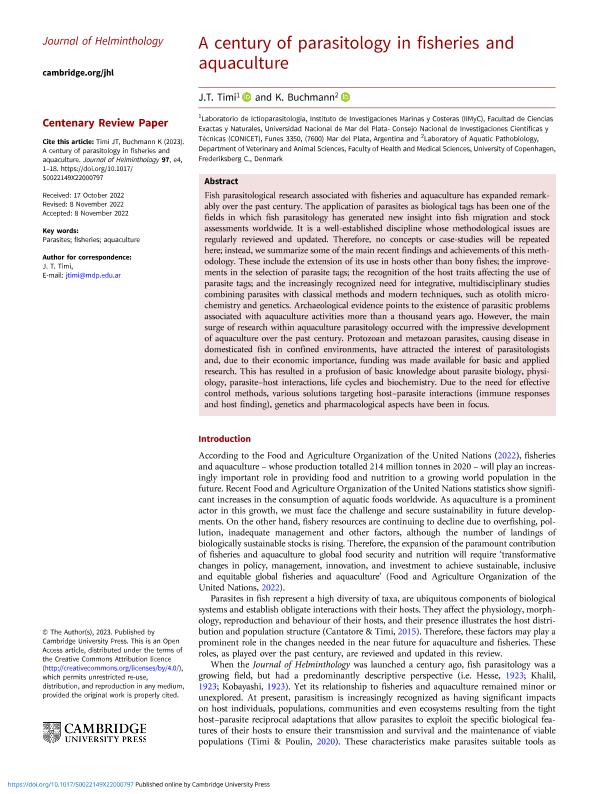Artículo
A century of parasitology in fisheries and aquaculture
Fecha de publicación:
02/2023
Editorial:
Cambridge University Press
Revista:
J. Helminthol.
ISSN:
0022-149X
Idioma:
Inglés
Tipo de recurso:
Artículo publicado
Clasificación temática:
Resumen
Fish parasitological research associated with fisheries and aquaculture has expanded remarkably over the past century. The application of parasites as biological tags has been one of the fields in which fish parasitology has generated new insight into fish migration and stock assessments worldwide. It is a well-established discipline whose methodological issues are regularly reviewed and updated. Therefore, no concepts or case-studies will be repeated here; instead, we summarize some of the main recent findings and achievements of this methodology. These include the extension of its use in hosts other than bony fishes; the improvements in the selection of parasite tags; the recognition of the host traits affecting the use of parasite tags; and the increasingly recognized need for integrative, multidisciplinary studies combining parasites with classical methods and modern techniques, such as otolith microchemistry and genetics. Archaeological evidence points to the existence of parasitic problems associated with aquaculture activities more than a thousand years ago. However, the main surge of research within aquaculture parasitology occurred with the impressive development of aquaculture over the past century. Protozoan and metazoan parasites, causing disease in domesticated fish in confined environments, have attracted the interest of parasitologists and, due to their economic importance, funding was made available for basic and applied research. This has resulted in a profusion of basic knowledge about parasite biology, physiology, parasite-host interactions, life cycles and biochemistry. Due to the need for effective control methods, various solutions targeting host-parasite interactions (immune responses and host finding), genetics and pharmacological aspects have been in focus.
Palabras clave:
AQUACULTURE
,
FISHERIES
,
PARASITES
Archivos asociados
Licencia
Identificadores
Colecciones
Articulos(IIMYC)
Articulos de INSTITUTO DE INVESTIGACIONES MARINAS Y COSTERAS
Articulos de INSTITUTO DE INVESTIGACIONES MARINAS Y COSTERAS
Citación
Timi, Juan Tomas; Buchmann, Kurt; A century of parasitology in fisheries and aquaculture; Cambridge University Press; J. Helminthol.; 97; 2-2023; 1-18
Compartir
Altmétricas




